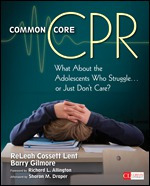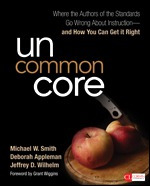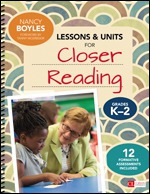
This reading list from Common Core CPR will help you create an inquiry unit on creating a sustainable future built around dystopian novels.

This reading list from Common Core CPR will help you create an inquiry unit on creating a sustainable future built around dystopian novels.

This inquiry unit, excerpted from Uncommon Core and built around essential questions addressing Martin Luther King's A Letter from Birmingham Jail, not only develops students' reading and writing skills, but also helps students grapple with important social issues.

This close reading lesson from Lessons & Units for Closer Reading, Grades K-2, helps students better understand the text; includes Activity Cards.
The following activity from Concept-Based Literacy Lessons, Grades 4-10, uses strategies to promote critical analysis through the example of dystopian societies.
In this exerpt from These 6 Things, you'll learn to address the common student hang-up of public speaking and find strategies for how to address and prevent fear of public speaking in the classroom.
Use this lesson from Text Structures from Fairytales to guide students to deeper understanding of the concept of challenge through analyzing the story of Cinderella.
Maria Walther, author of The Ramped-up Read Aloud, lists her six tips for ramping-up your read aloud experiences to inspire our students and keep them engaged and interested in reading.
In her blog on Corwin Connect, Julie Wright, author of What Are You Grouping For?, provides the answer to how we move toward more individualized learning opportunities within our time constraints: small-group reading experiences.
These lessons from Writers Read Better: Nonfiction focus on drafting nonfiction pieces, which will help students to decide for themselves the best ways to present their information to their readers.
There's no sense to learning to spell words we don't understand. This activity from Word Study That Sticks helps you review with your K-2 students the words they understand (or don't) for greater clarity.
Informational texts facilitate reading development, help shape students’ understanding of the world, and build their habits of inquiry. Use this chapter from Text Complexity to learn more about selecting informational texts for your students.
In this webinar, Julie Wright and Barry Hoonan, authors of What Are You Grouping For?, walk you through five teacher moves for growing students’ reading muscles through small-group learning experiences: kidwatching, pivoting, assessing, curating, and planning.